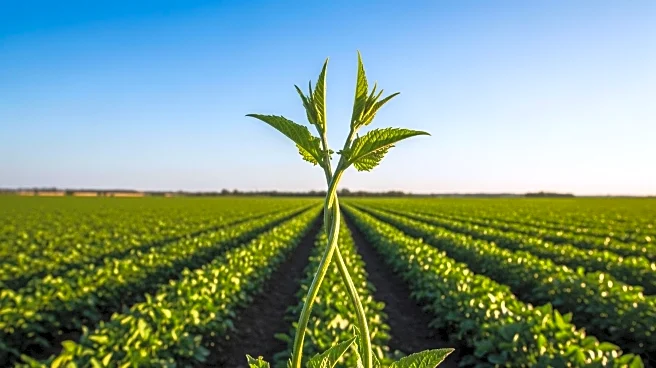What is the story about?
What's Happening?
Federal Minister for Food Security and Research Rana Tanveer Hussain has emphasized the importance of cooperative farming as a solution to the challenges faced by small and medium farmers in Pakistan. During a high-level meeting, Hussain highlighted that cooperative farming can provide farmers with access to advanced machinery, climate-smart techniques, interest-free agri-finance, and direct market linkages. This model aims to reduce production costs, eliminate middlemen, and ensure farmers receive a fair share of profits. Cooperative farming is seen as a way to organize farmers into cooperatives, allowing them to pool resources, share knowledge, and jointly invest in machinery. The initiative is part of a broader government strategy to uplift the rural economy and reduce reliance on costly food imports.
Why It's Important?
The push for cooperative farming is significant as it addresses the persistent challenges faced by small and medium farmers, who constitute the majority of the farming community in Pakistan. By providing access to modern technology and financial resources, cooperative farming can enhance productivity and profitability for these farmers. This approach not only aims to empower farmers but also seeks to secure Pakistan's agricultural future by reducing dependency on food imports. The initiative could lead to improved yields and economic benefits, contributing to the country's food security and economic stability. However, there are concerns about the potential for corporate control over supply chains and pricing, which could impact small farmers negatively.
What's Next?
The government plans to support farmers through modern storage facilities, processing units, and export-oriented packaging centers under the cooperative model. Technical guidance and financial assistance will be provided to ensure the success of cooperative farming. The Cooperative Societies Amendment Act of 2020 provides the legal framework for establishing cooperative entities, emphasizing democratic decision-making and equitable distribution of benefits. The government is committed to promoting cooperative farming as a bottom-up approach to integrate a vital segment of the informal economy into the documented sector.
Beyond the Headlines
Cooperative farming represents a shift towards more sustainable agricultural practices, potentially leading to long-term benefits for small farmers. By consolidating small holdings into larger farm sizes, mechanized farming becomes feasible, offering a way to increase efficiency and productivity. Transparency and accountability within cooperatives are crucial to ensure fair distribution of benefits and encourage more farmers to join. This model could transform the agricultural landscape, fostering collaboration and innovation among farmers.
















